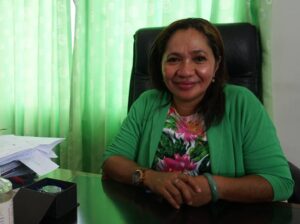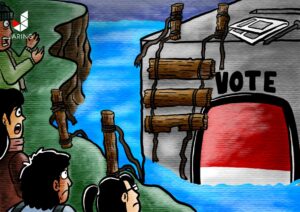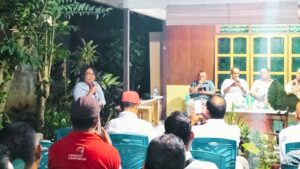Recently, the Elections Supervisory Body (Bawaslu) has just reported the General Elections Commission (KPU) to the Elections Honorary Council (DKPP) on the code of ethics breach allegedly committed by KPU during the 2020 regional elections. As a consequence, the KPU chairman Arief Budiman was removed from his position.
The Bawaslu believed that Arief had already violated institutional ethics when he accompanied Evi Novida Ginting, another (now former) KPU commissioner.
Arief accompanied Evi when she was visiting the State Administrative Court to file her lawsuit against President Joko “Jokowi” Widodo’s decree No. 34/P/2020 which had fired Evi dishonorably from her KPU position on April 19, 2020. Jokowi announced Evi’s removal after she had also violated electoral code of ethics regarding a legislative candidate vote turnout counting process in 2019.
Various elections observers, however, believe that interinstitutional rivalries have something to do with the whole drama, in which different electoral institutions report each other’s commissioner under ethical breach accusations.
The Indonesian Islamic University (UII) Yogyakarta State Administration Professor Nikmatul Huda said that rearranging the institutional roles of Indonesia’s three elections organizers (KPU, Bawaslu, DKPP) could help overcome rivalry among them. The KPU, Bawaslu and DKPP, according to Nikmatul, needs to be positioned as institutions which should not fight against each other to have the upper hand in the regulating the law legally.
Jaring.id recently interviewed Nikmatul over the phone on Monday, Jan. 25, to tap into her views on the rivalry among the three institutions and the impacts of such rivalry on Indonesia’s democracy. Below are some passages from the interview:
What do you think are the biggest lessons we’ve learned from the simultaneous elections in 2020?
First of all, we need to highlight the candidacy process. There were 25 regions with single candidates only during the last elections. In my view, this is unhealthy for our democracy. Throughout the 2017, 2018 to the 2020 elections, we’ve seen more and more single candidates emerging across Indonesian regions. In terms of democracy, this is a big problem, because this reflects on the political parties’ inability to groom candidates who can compete in the democratic process. When the parties are unable to back candidates to go forward, we can see that our political parties are very weak.
Second, the high budgetary burden of the regional elections have also caused transactional politics to flourish in the country. These two things are just enough to measure the quality of democracy in Indonesia.
What about the 132 lawsuits regarding electoral disputes, which have been filed to the Constitutional Court?
When we look at Elections Law No. 7/2017, and all the legal products derived from it, it seems like currently the Constitutional Court is being seen as a space to negotiate electoral disputes alone. The highest court has jokingly been referred to as the “calculator court” because now it only handles voting turnout disputes as its main activity. The highest court has also ceased to handle issues related to campaign violations, which include civil apparatus mobilization as well as indications of structural, systemic and massive violations, which are currently under the jurisdiction of the Bawaslu.
Nonetheless, electoral disputes still serve as an interesting topic of conversation because almost half of all the regional elections organizers across the country are currently filing lawsuits. That amount of lawsuit only leads to a question: are these people simply dissatisfied with their defeat or do they simply want to satisfy their desire to sue people they believe have caused their losses, no matter whether they win the lawsuit or not? I tend to believe that the latter is what truly happens right now in our country. That only points out toward the fact that our country’s democracy is still confined within the procedural realm only, without touching a more substantive democratic process.
What do you mean by that?
Regional leader candidate must uphold high standards of ethics by, for instance, making sure they don’t want to win at all costs to the point that they’re using devious ways, including transactional politics, money politics or dowry politics (in which strong political parties collude to champion a single candidate to secure absolute power) to win.
How can Indonesia implement a more substantive system of democracy?
We’re still far away from that goal. Nonetheless, we have improved our democratic processes significantly. A long time ago, when people were disappointed by their losses, they used to burn the KPU offices. Nowadays, nobody has done that kind of thing anymore. Now, people have legal channels they can access when they’re disappointed by their defeat. When we look at the formal legal foundation for elections-related disputes, the foundation has been quite decent. Yet, we still need to pay close attention to whether the people who occupy the election organizers’ leadership seats are highly integrous, dignified and democratic people who have the imagination it takes to direct Indonesia’s democracy toward a better place or not. We have to look carefully at whether they can conduct high-integrity elections or not.
Three elections bodies are currently attacking each other right now. What do you make of the rivalry among them?
Regulation-wise, the DKPP has full authority in organizing a trial on ethical breach allegations. Each ruling made by the DKPP is equally valid, yet the KPU is entitled to reject the ruling by appealing to the state general court. On the realm of the elections regulations issued by the Constitutional Court, the court has also stated that no institutions outside the internal court handling electoral ethics issues are allowed to issue binding rulings.
Seen in this light, the DKPP is no more than just an internal ethics court. Its rulings are final, yet they are not binding. In the future, will the KPU chairman file a lawsuit regarding the DKPP’s ruling? For me, I question whether it’s worth firing Arief over accompanying Evi to the state general court. I suspect there’s a different issue behind all this. I don’t really understand the incident behind the DKPP ethical breach ruling.
Other incidents have frequently highlighted the difference of opinions between the KPU and Bawaslu… what do you make of this?
Indeed, so many cases have indicated that both institutions are often at odds with each other. For instance, when a regulation prohibiting ex-graft convicts from running for office was first discussed, Bawaslu supported the new regulation vehemently, while KPU still believed that the ex-graft convicts still had a right to run for office, based on the Constitutional Court’s decree no. 56/PUU-XVII/2019. The same decree said that the ex convicts could still run for office as long as they had already served their time in prison and there was a five-year gap between the time they got out of prison and the time of the elections. I perceive something unclear about this because the KPU still held a normative view back then, aligned with the court’s ruling, while the Bawaslu retained a more idealistic point of view.
This kind of rivalry could happen because currently the electoral organization system guaranteed the quality among KPU, Bawaslu and DKPP. Long time ago, the Bawaslu was below the KPU and DKPP in the hierarchy, thus it was required to bow down to the wills of KPU and DKPP. Now, the Bawaslu has been equal to the other two institutions, as all of them were voted by political parties through the House of Representatives. Their equality has resulted in their fighting against one another. To prevent rivalry among the three institutions, I believe that we need to shift the currently-in-place balance of the regulatory mechanisms. The main objective of this is to prevent the Bawaslu, KPU and DKPP from fighting against one another.
How can we shift the balance among the three institutions?
You can simply place the Bawaslu below the KPU, and the DKPP below the KPU in terms of the institutional authority hierarchy. Or you can simply run the current egalitarian system, yet requiring all institutions to obey the court ruling. If this cannot work, you can simply change it into the first scenario I offered.
The problem is, how to place these institutions in a political hierarchy perspective becomes a tricky question, considering that the individuals in the three institutions are selected by political parties who have an agenda to make sure that their parties do not face any obstacles during the elections process.
What are the consequences of the rivalries?
The first consequence is, as we’ve seen, big disputes. Second, the disputes won’t focus on substantial democracy issues and the creation of integrous electoral foundations, as these disputes will merely discuss procedural matters only.
Will such disputes threaten our democratic processes?
I do think so. When political parties select the members of these three institutions, there can be compromises made in the selection process. It’s possible that the individuals who get into these institutions are in actuality not independent and cannot contribute anything to the political parties. Ideally, the members of KPU, Bawaslu or DKPP are appointed by the President in an open process involving the public. This selection process can potentially help us avoid rivalries.
Currently, the Elections law is being revised. Do you think we need to include this rivalry prevention program in the revised document… and if so, what are your specific notes about it?
I’d like to highlight article 222 which asserts that a person can only run as a presidential candidate when s/he has already gained support from the political parties who had already joined the previous elections. This is not rational. Maybe this kind of regulation exists only in Indonesia. In our constitution, there are no such requirements. The constitution stipulates that any political parties or a coalition of political parties are free to propose any individual candidates.
How come?
It seems like the House of Representatives has just come up with a new way to quash new political parties from proposing their candidates. This is a game played by big political parties so that they can be the only ones proposing presidential candidates. I think we need to revise the regulations on that article.
The revised law also contains Articlers 210 and 264, which state that political parties who commit any political dowries in their candidacies will be punished. Yet, is the legal foundation for this strong enough yet?
The old general elections regulation also mentioned the same punishment. Yet, despite the regulation prohibiting political parties from conducting political dowries, in fact a lot of single candidates are still part of the political dowries in which political parties collude with each other to make sure that they secure victory through single candidacy.
In your opinion, what will the future hold for our democratic parties?
It can be better and it can be worse at the same time. I hope it can be better, yet it won’t happen unless we radically transform the system.







